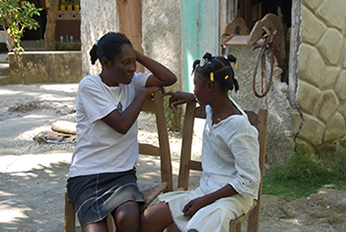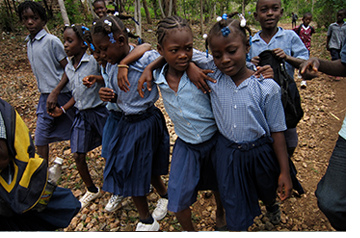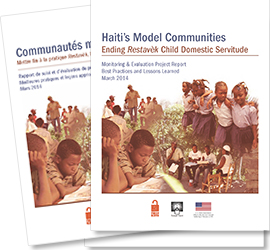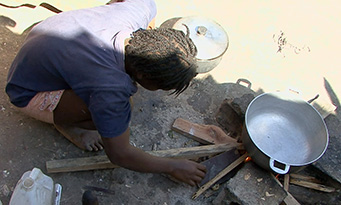Haiti
Slavery in Haiti
The Practice of ‘Restavèk’
 Restavèk is a traditional system in which Haitian children from impoverished homes are sent by parents to live with other families and work for them as domestic servants.
Restavèk is a traditional system in which Haitian children from impoverished homes are sent by parents to live with other families and work for them as domestic servants.
Ideally the child is enrolled in school by the host household and treated like one of the family. But often this does not happen.
For many children, the day is filled with chores. Even the youngest are expected to fetch heavy buckets of water, hand-wash clothes, carry loads to and from the marketplace, and work in the fields—often laboring for 14 hours a day for no pay.
Children in Haiti’s restavèk system often suffer a kind of apartheid, reduced to a subjugated status in their household and in society—sleeping on the floor, dressed in rags, eating leftovers, and often beaten. Two-thirds are girls, and many are viewed by men in the family as convenient objects for sexual exploitation. Girls are often abruptly expelled from the household if they become pregnant.
Successive generations have grown to adolescence in this atmosphere of shame, neglect, and abuse. Estimates of the number of children living in restavèk range from 150,000 to 300,000.
Our Solutions in Haiti
Fighting Slavery at Its Source
 Free the Slaves has initiated a holistic method for community development that is one of the first of its kind in Haiti.
Free the Slaves has initiated a holistic method for community development that is one of the first of its kind in Haiti.
The Model Communities approach is based on the premise that building community consensus against restavèk can prevent and reverse the flow of children into servitude.
The strategy has six core components…
- Community-based assessment, including social mapping and participatory wealth ranking, to identify children in servitude and those at risk
- Open space dialogue to facilitate large-scale community discussions and consensus building
- A participatory learning curriculum using illustrated story books that bring to life the trauma experienced by children in slavery
- Community-based child protection committees to take preventive action with their neighbors, support the return and reintegration of restavèk children, and lead advocacy for needed government services
- An accelerated education program to allow overage students to complete the standard six-year primary school curriculum in three years
- Livelihoods interventions that integrate food and household security components to match the community’s will to protect children while keeping them at home
Free the Slaves has successfully piloted the Model Communities approach in several source communities where parents have been sending their children away into restavèk. We are now scaling-up the program by expanding the strategy to other locales.
Strengthening Law Enforcement
Haiti has enacted one of the world’s newest anti-slavery laws. The legislation defines human trafficking to include restavèk child domestic servitude, and it toughens punishment for traffickers and families who exploit children.
Free the Slaves advocated for passage of the legislation. We are continuing our advocacy efforts by pressing for proper implementation steps in the formation of a special committee designated to implement the new law.
Improving Haiti Research
Free the Slaves is participating on a technical committee that has been guiding the research methodology, and is now commenting on the findings, of a major national survey on child domestic work in Haiti, being conducted by UNICEF. Free the Slaves will continue to advise UNICEF on recommendations for next steps based on the research results.
Our Partners in Haiti
Beyond Borders & Free the Slaves have join forces in Haiti for Greater Impact. Read details here.
In Haiti, our current and previous partners have included:
- Fondasyon Limyè Lavi: The Light of Life Foundation works in partnership with other organizations to enable people from disadvantaged communities to cultivate a quality education and experience based on mutual respect and dignity, and that leads to autonomy.
- Beyond Borders: Beyond Borders helps people build movements to liberate themselves from oppression and isolation. In Haiti and the United States, Beyond Borders is bringing people together for just and lasting change.
- Abas Systeme Restavèk (Abolish the Restavèk System): As a network of more than 18 local Haitian organizations dedicated to helping children in restavèk, ASR raises awareness about the problem of child domestic servitude locally and internationally and works to strengthen the capacity of its members to improve their services to affected children. ASR advocates with the Haitian government to take action and enforce laws against child domestic servitude.
- UNICEF: United Nations Children’s Fund

Haiti’s Model Communities
Restavèk is a traditional system in which Haitian children are sent to live with other families and work as domestic servants. The expectation is for the host family to provide schooling, food, and shelter. Yet many children are abused and enslaved in their new homes. The Model Communities project is based on the premise that building community consensus against restavèk is a strong strategy to prevent and reverse the flow of children into domestic servitude.
The Latest From Haiti
Hope Amid Crisis in Haiti
You have probably seen in the news that Haiti is facing a crisis with multiple layers: political instability, a natural disaster, economic uncertainty, food shortages, and kidnappings for ransom. The president was assassinated, a 7.2 earthquake killed more than 2,000...
Joint Statement and Call to Action on the Crisis in Haiti
In response to the crisis in Haiti, which has deepened in the wake of the assassination of President Jovenel Moïse, we, the undersigned individuals and organizations, express our condolences and sympathy to all of the Haitian families that have lost a loved one to the...
Haiti Insecurity Could Increase Child Slavery
We are still in shock about Haiti. On July 7, we awoke to news that President Jovenel Moïse had been assassinated overnight. Major cities went into lockdown and a power vacuum has now worsened the political crisis with no clear path out. The parliament is...

